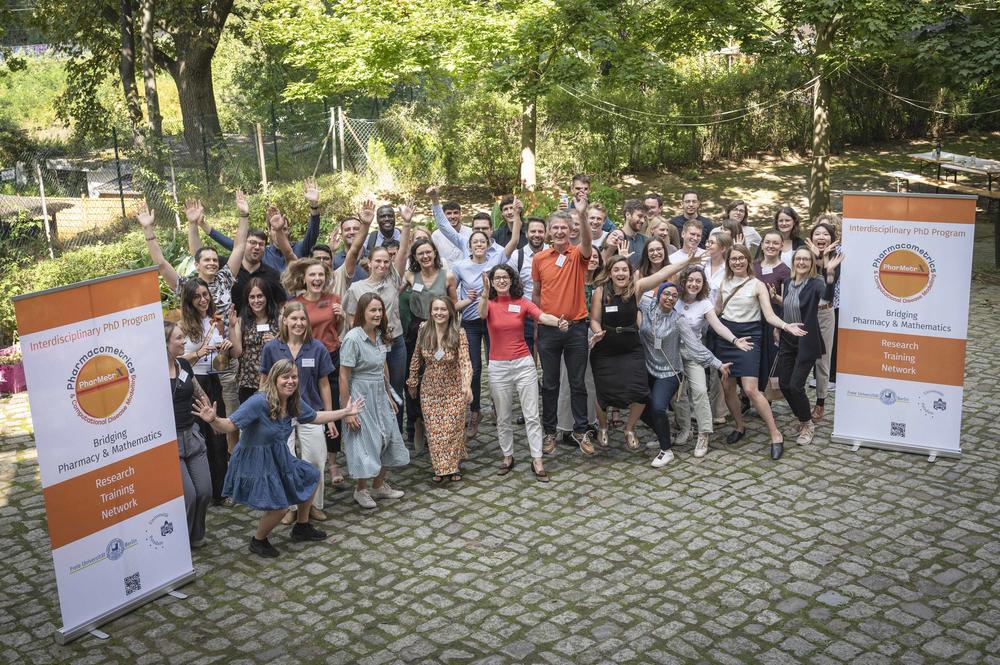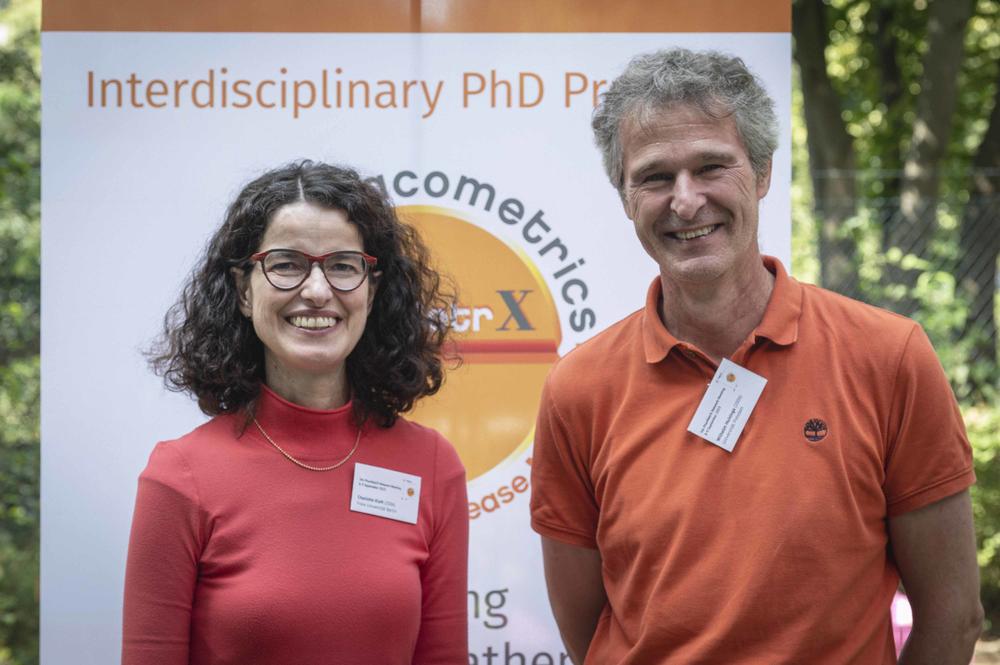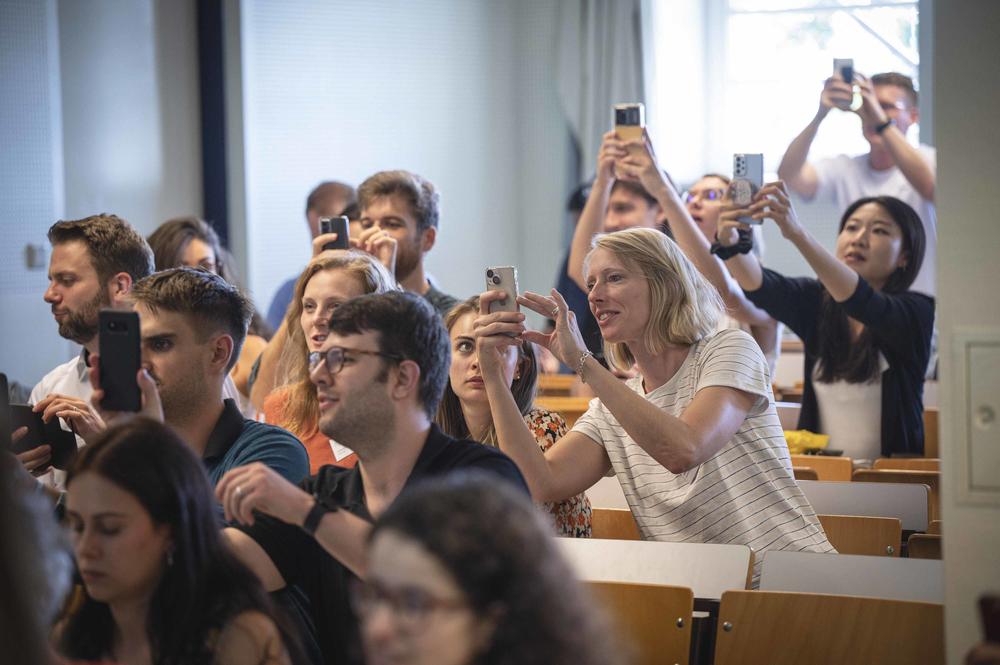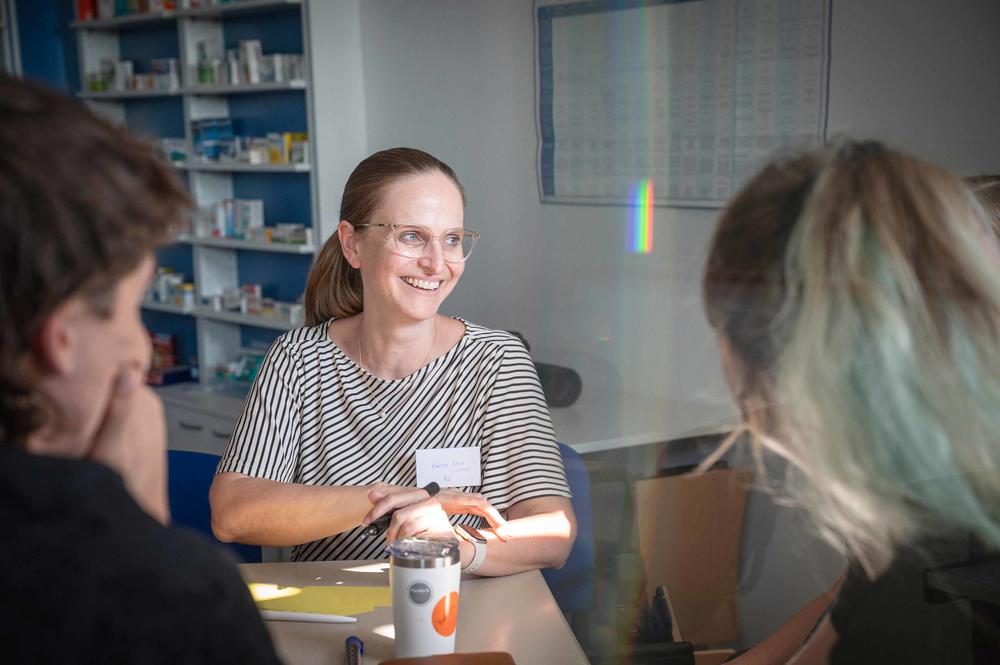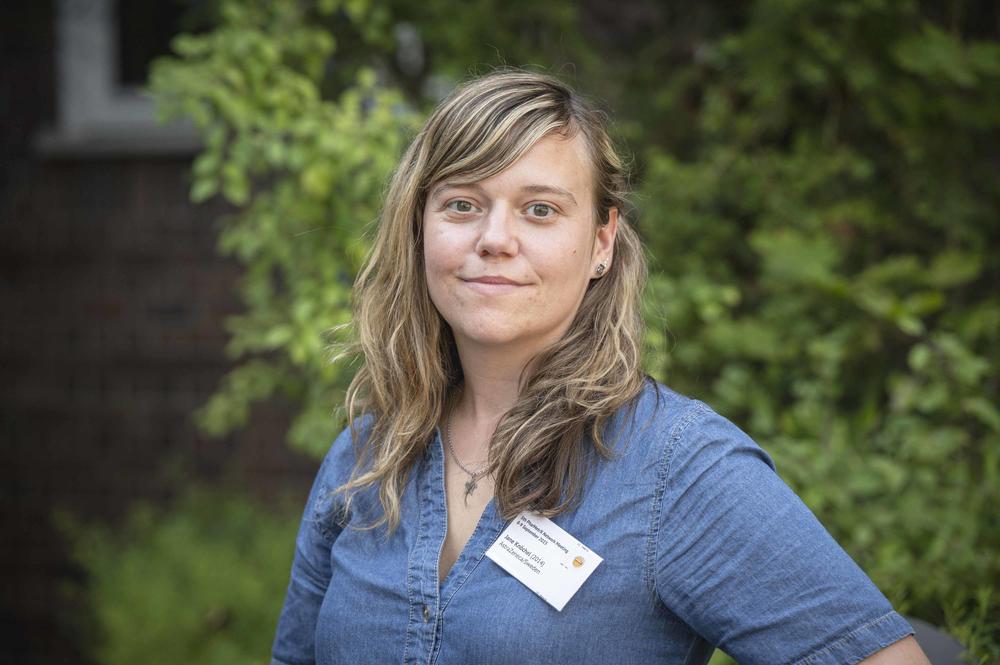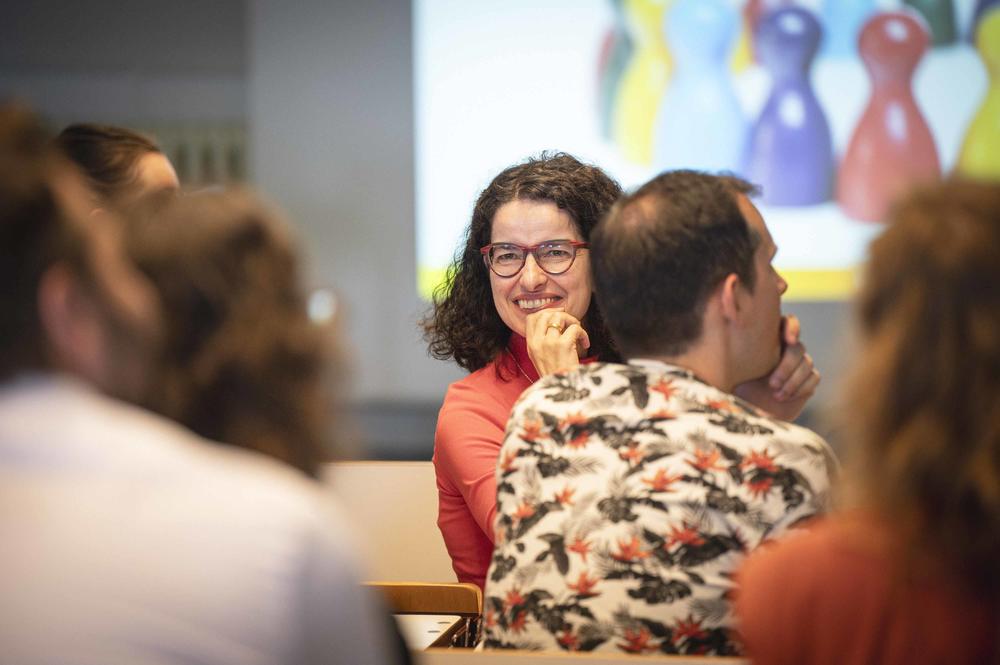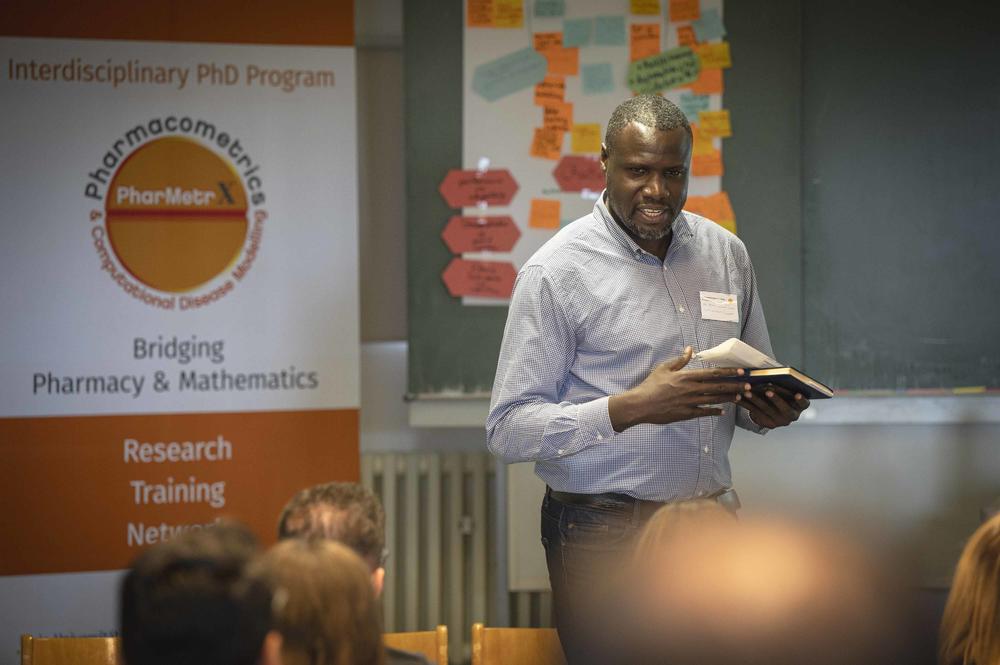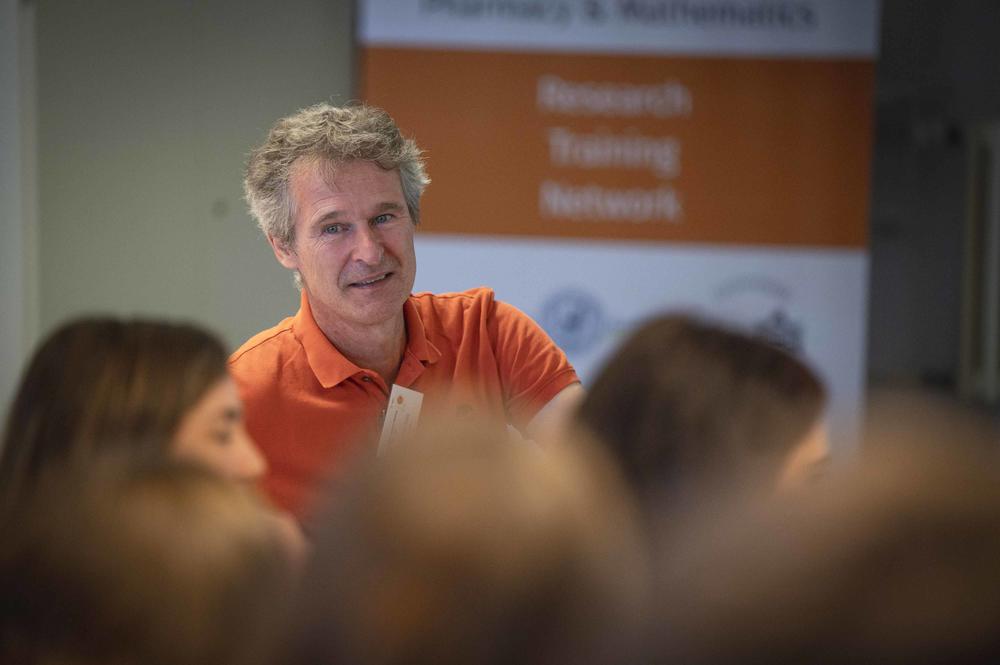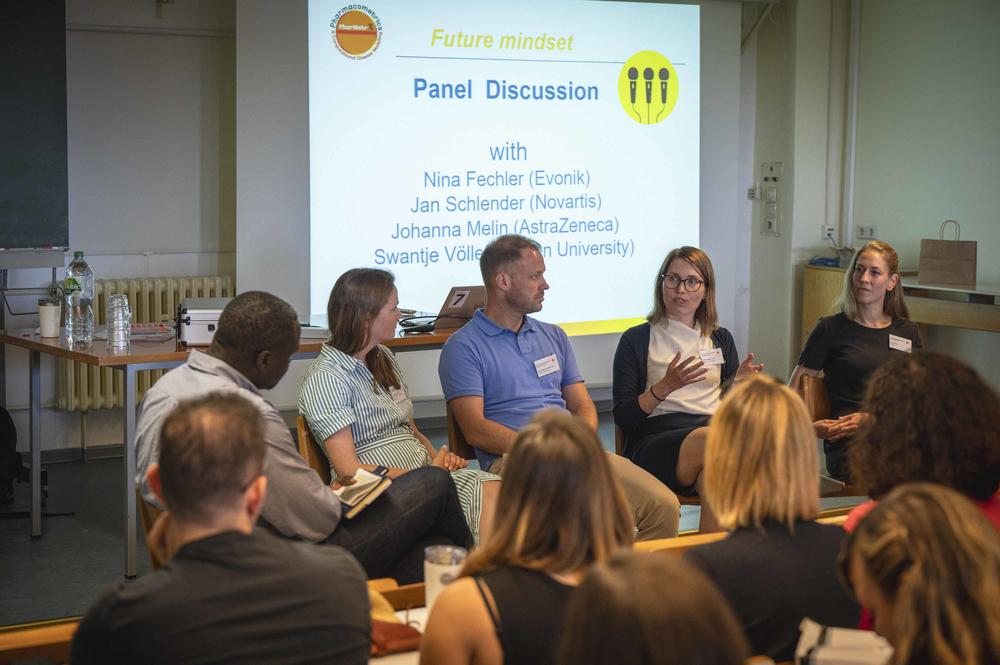PharMetrX: Connecting Researchers across Disciplines to Advance Drug Treatments and Tailor Dosage
For fifteen years the doctoral program at Freie Universität Berlin and the University of Potsdam has been combining pharmacy and mathematics with the goal of making drug treatments more individualized
Jul 05, 2024
The PharMetrX network continues to grow year after year. Group photo from the PharMetrX alumni event in September 2023 in honor of the program’s fifteenth anniversary.
Image Credit: Bernd Wannenmacher
Take one tablet three times a day after meals – anyone who has filled a prescription at a pharmacy is familiar with dosage instructions like these and sees them in the patient information leaflet. Yet, dosing is often too standardized, says Professor Charlotte Kloft, head of the Department of Clinical Pharmacy and Biochemistry and dean of research at the Department of Biology, Chemistry, Pharmacy, Freie Universität Berlin. “A tablet with a certain strength can have drastically different effects on, for example, a woman weighing 50 kilograms and a man weighing 120 kilograms.”
This issue is at the core of the PharMetrX doctoral program run by Freie Universität and the University of Potsdam “We want to build bridges between pharmacy and mathematics – with the goal of ensuring that every single patient receives precisely the right amount of medication they need in order to return to good health,” says Kloft.
Cooperation between Freie Universität Berlin and the University of Potsdam
Professor Kloft founded the PharMetrX – Pharmacometrics and Computational Disease Modelling program in 2008 together with Wilhelm Huisinga, professor of mathematical modeling and systems biology from the University of Potsdam. The doctoral program attracts students from fields such as pharmacy, the life sciences, bioinformatics, and mathematics.
Doctoral candidates learn how to work together to address research questions at the intersection of pharmacy and mathematics, namely, in the field of pharmacometrics, which analyzes data from clinical studies using computer modeling to assess how drugs affect our bodies. The specialized training in pharmacometrics that doctoral students in the PharMetrX program receive provides them with expertise in subfields such as pharmacodynamics (i.e., the study of how active drugs affect the body) and pharmacokinetics (i.e., the study of a drug’s concentration-time course through the body).
The founders of PharMetrX: Charlotte Kloft, professor of clinical pharmacy and biochemistry at Freie Universität, and Wilhelm Huisinga, professor of mathematical modeling and systems biology at the University of Potsdam.
Image Credit: Bernd Wannenmacher
“If there is one thing that makes PharMetrX stand out, it is its truly interdisciplinary approach to research,” says Professor Huisinga. “Students from different subjects come together and learn from each other, both in terms of both scientific knowledge and interpersonal interactions. It is fascinating to see how they develop their interdisciplinary language skills to solve problems collaboratively. This unique language is more than the sum of the parts of the individual scientific disciplines from which the students come.”
The program spans three-and-a-half years, during which the doctoral candidates complete five modules. The alumni reunion was a festive occasion for graduates from different cohorts to meet up.
Image Credit: Bernd Wannenmacher
With each graduating class the PharMetrX network grows, giving future program participants an even broader pool of experts to draw from when it comes to mentoring, internships, knowledge transfer, future careers, and an enriching exchange of ideas and experiences in general. To celebrate PharMetrX’s fifteenth anniversary, graduates from over the years, going back to the very first one in 2008, were invited to Freie Universität last September. “Our alumni are the heart of the program. They have gone on to have wonderful careers,” says Kloft. “I never would have imagined that the rather small program we launched would result in something so expansive and innovative.”
Valerie Nock graduated from the second cohort to complete the PharMetrX program. “It was easy for me to transition from academia to industry because the work I’m doing now is directly related to what I learned at PharMetrX.”
Image Credit: Bernd Wannenmacher
Valerie Nock is a graduate from the early days of the PharMetrX program. Now she works at the pharmaceutical company Boehringer Ingelheim in Biberach, where she is head of their global pharmacometrics groups that includes over thirty-five pharmacometricians.
She also acts as an “industry mentor” for PharMetrX doctoral students who want to learn more about daily operations in her profession. Those kinds of insights were a big help to Nock herself when she was in the program. “It was easy for me to transition from academia to industry because the work I’m doing now is directly related to what I learned at PharMetrX,” she says. The close ties to industry and the professional world of drug development were major assets of the program in Nock’s opinion.
Jane Knöchel came to PharMetrX in 2014 with a background in mathematics. “The intensive interdisciplinary collaborations and the cohesiveness of the group is really one of a kind.”
Image Credit: Bernd Wannenmacher
Jane Knöchel came to PharMetrX in 2014 with a background in mathematics. Today she works as a pharmacometrician for AstraZeneca in Sweden. The active network the program has generated is especially important to her. “The intensive interdisciplinary collaborations and the cohesiveness of the group is really one of a kind. That atmosphere helps keep you motivated during your doctoral studies and keeps you from getting tunnel vision, where you might otherwise only think about your dissertation and get trapped in an academic bubble.”
The cohesive group dynamic even extends across the different cohorts of students and graduates. “There was really a feel of belonging to a community, which made it easy to not be shy and simply to ask questions,” says Knöchel. The ability to communicate effectively with people from other disciplines is a skill she uses regularly in her work. “PharMetrX taught me how to speak a transdisciplinary language.”
Professor Kloft: “I never would have imagined that the rather small program we launched would result in something so expansive and innovative.”
Image Credit: Bernd Wannenmacher
Andre Schäftlein shares the same sentiment. He graduated with the third cohort to complete the PharMetrX program and is now the head of the hospital pharmacy at the Havelland Hospitals, near Berlin, where he is also deputy medical director. “I applied to the PharMetrX program because I didn’t want to do just research for research’s sake,” says Schäftlein. “I wanted to do something that would help patients.”
When he first started he was surprised to find out how little the individual disciplines knew about one another. Thanks to PharMetrX he learned to expand his horizons. “Unfortunately, people are often quick to judge, but the best way to develop new solutions is to engage with other people’s ideas, even if they seem strange at first. It’s an approach that also teaches you to critically reflect on yourself.”
Schäftlein encourages anyone interested in the program not to be afraid of taking courses in PharMetrX modules outside of their main subject. “Just having a little curiosity is enough of a prerequisite. You don’t need a lot of previous knowledge since you will be able to draw from a vast network of experts, who are more than willing to provide you with whatever you need.”
Francis Williams Ojara is another PharMetrX alumnus. He teaches pharmacometrics at Gulu University in northern Uganda, where he is also conducting research on infectious diseases. Berlin became like a second home to him through the PharMetrX program.
Image Credit: Bernd Wannenmacher
Francis Williams Ojara teaches pharmacometrics at Gulu University in northern Uganda, where he is also conducting postdoctoral research on infectious diseases. He graduated from the PharMetrX program in 2022. Looking back, he says, “The program gave me so much more than I had expected. Berlin became like a second home to me through the PharMetrX program.”
For Ojara, PharMetrX is not just an educational program of the highest quality, it also stands out due to the sense of community that connects the students and graduates from the various cohorts. “It’s a connection that never goes away. Meeting new faces means a chance to make new friends.” One of Ojara’s students is in the process of applying to the program. “PharMetrX is a great choice for anyone who is interested in clinical research and wants to make a change, while remaining true to themselves.”
Professor Huisinga notes that during the PharMetrX program doctoral researchers develop a shared, interdisciplinary language that they use to solve problems together – a language that goes beyond the subject-specific language of their disciplines.
Image Credit: Bernd Wannenmacher
Sebastian Wicha is a professor of clinical pharmacy at Universität Hamburg. He graduated from the PharMetrX program in 2015. During his pharmacy degree program, he never encountered pharmacometrics. It was not until a research stay in the United States that he heard about it for the first time from the German-American pharmacist and clinical pharmacologist Hartmut Derendorf. “I thought to myself: Amazing! Here’s a field that allows me to combine all of my major interests, namely pharmacy, mathematics, chemistry, and programming,” Wicha recalls.
Hartmut Derendorf was professor of pharmaceutics at the University of Florida where he taught until his retirement in 2018. He put Wicha and Kloft in contact, and Wicha promptly applied to the program.
“Before the founding of PharMetrX, pharmacometrics was something that was only talked about in industry,” Wicha says. Charlotte Kloft and Wilhelm Huisinga’s work with PharMetrX has established pharmacometrics as a viable academic field and at the same time they have created a German institution with a global reputation. The program gives researchers the freedom to explore new areas and make advances in the field thanks to scholarships funded by research-focused pharmaceutical companies with the same goals –with no expectation of direct returns. “It’s a stroke of genius!” says Wicha.
Learning from one another: Graduates from the program at a panel discussion.
Image Credit: Bernd Wannenmacher
Over the course of five modules, PharMetrX students learn collaboratively. With their various academic backgrounds, they pool their knowledge in order to help each other reach the same level of expertise, thereby establishing the basis for their individual doctoral research. In addition, the program includes two modules devoted to industry experience, in which doctoral students get hands-on knowledge of the practical side of pharmacometrics. All in all, the program lasts three and a half years.
PharMetrX is supported by a consortium of global pharmaceutical companies: AbbVie, AstraZeneca, Boehringer Ingelheim, Hoffmann-La Roche, Merck, Novo Nordisk, and Sanofi-Aventis. Many of the program’s graduates have gone on to pursue careers with one of these companies.
Others have looked to non-university research institutions, pharmacies, hospitals, government agencies responsible for approving medicinal products, and universities, as places to share their training and expertise, where they can help advance the goal of getting patients the right dose of drugs to make them healthy again.
The original German version appeared in campus.leben, the online magazine published by Freie Universität Berlin.
Further Information
To learn more about the PharMetrX program visit https://www.pharmetrx.de/.

